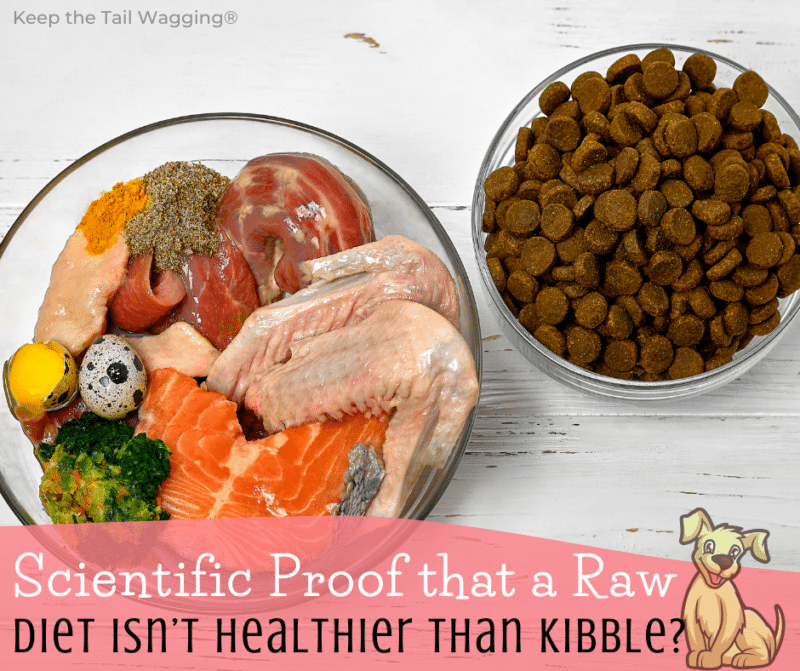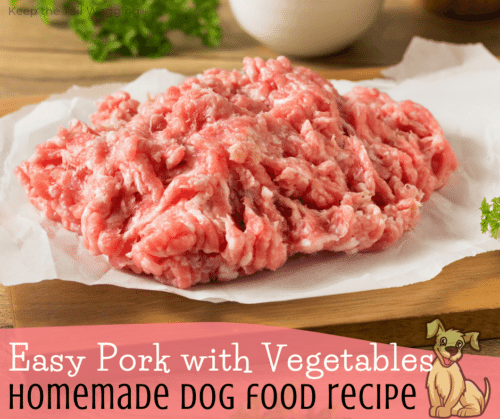Keep the Tail Wagging is supported by pet parents. I occasionally earn a commission (at no additional cost to you) when you click through an affiliate link to one of my favorite products. Thank you for your support. Read More
For over a decade, I was convinced that feeding my dogs a raw food diet would make them healthier, but according to a 2021 study, there isn't a difference between raw fed dogs and those fed a high-quality kibble diet. I often find myself defending my choice to feed raw to my dogs, and when studies like this hit the Internet, I need to take a look because the study will be used as evidence as someone tries to convince me to stop feeding raw meat to my dogs.
This is what I discovered:
- Fifty-five dogs were included in this study; I prefer studies with a larger sample size.
- Adult dogs of varying ages (1.5 years to 13 years) were included; all were fed kibble or raw for more than a year.
- Dogs that were recently vaccinated or had certain medications prescribed were eliminated from the study.
The following is a summary of the study.
Clinical Health Markers of Raw and Kibble Fed Dogs
In this study, the researchers wanted to compare the health of dogs fed a raw meat-based diet (RMBD) to those fed a high-quality commercial dog food. They hypothesized that dogs on the RMBD would have different biochemical and hematological (blood work) parameters and better clinical health scores than dogs on a kibble diet.
To conduct the study, the researchers gathered data from healthy dogs owned by clients. They divided the dogs into two groups: one group fed a raw diet (28 dogs), and the other group fed a kibble diet (27 dogs). The dogs had been on their respective diets for more than a year. The dogs in this study were fed the following brands:
- RAW: Titan Blends and Ross Wells (22 dogs); Texas Tripe (1 dog)
- KIBBLE: Purina ProPlan (12), Hills (9), Iams (2), Taste of the Wild, Royal Canin, Diamond, and Pedigree (1 each)
The researchers collected various health markers, including blood tests, urinalysis, and clinical health scores. They also assessed dental health, external ear canal health, and integument (skin) health. An evaluator who didn't know which group the dogs belonged to assigned scores for these health aspects on a scale of 0 to 3, with 0 being normal and 3 being the most severe.
They analyzed the data using statistical methods to:
- examine the relationship between biochemical outcomes and age and body condition score.
- determine if certain biochemical markers differed based on breed or gender.
- analyze the biochemical data, adjusting for factors like gender, breed, age, and body condition score.
For the clinical health scores, they created a composite score called the Composite Clinical Health Score (CCS), which was calculated by subtracting the sum of the dental score, otitis (ear infection) score, and integument score from 9. They compared the CCS between the two feeding groups using the Mann-Whitney test, a statistical test that compares two groups.
The results of the study showed that there were differences in specific biochemical and hematological parameters between the two feeding groups. However, the differences were not consistent across all parameters. There were also no significant differences in the clinical health scores between the two groups.
In summary, this study compared the health of dogs fed a raw meat-based diet to those fed a commercial kibble diet. The researchers found some differences in certain health markers, but overall, there was no clear evidence that one diet was superior to the other in terms of overall health.
My Thoughts on this Study
I love that studies are happening and people are asking questions about fresh food. However, I've learned that read more into studies, and I believe this one missed the mark, which I'll explain.
1 – Population Size
The larger the number of dogs in a study, the greater the certainty that the observed effects are genuine. If only two dogs are part of the test group, any improvement can be attributed to luck. However, if the group consists of 100 dogs, there is much more certainty in the findings.
2 – Healthy Dogs
The dogs chosen for the study were healthy dogs. They examined their records and eliminated dogs on antibiotics, steroids, and other medications – all of which could identify health issues that may benefit from fresh food. I'd also want to know more about the dogs' lifestyle – how much exercise they get daily, whether they are overweight, what's their stress level, and what about toxins? When you start a study with healthy dogs, can you be surprised that your results show that you have healthy dogs
A better study would be to have people sign up and track their dogs over time – checking in with them annually – similar to The Long Living Pets Research Project.
Is Raw Healthier than Kibble?
I think fresh food is superior to processed food. This isn't a slam on kibble or anyone who feeds kibble. I believe fresh food is healthier for me than a diet of processed foods. However, every dog is different, and many things contribute to a healthy dog, including their genetics, environment, diet, and activity levels.
I hope to see more studies on how our dogs respond to various diets. However, the evidence failed to prove that raw-fed dogs are healthier than kibble-fed dogs overall.
















